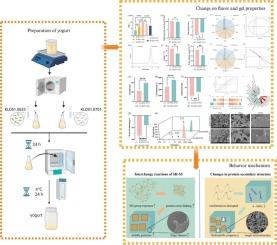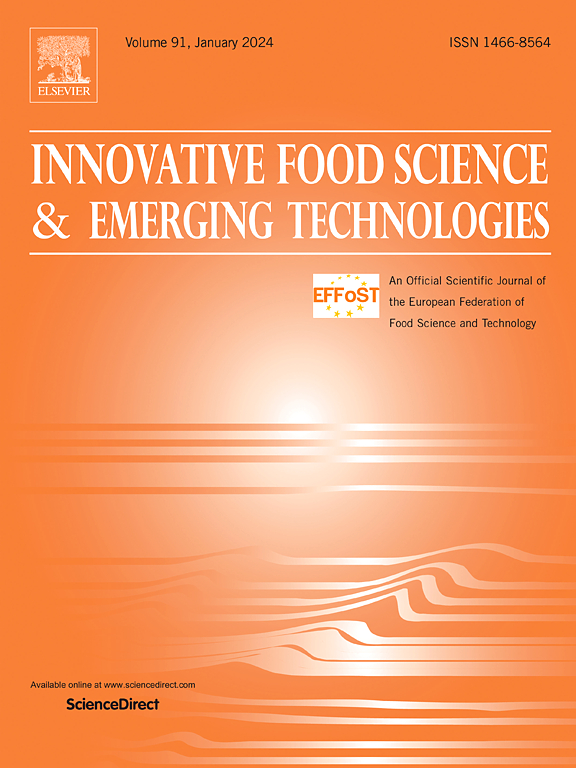Differences in protein hydrolysis on quality of fermented milk: The changes in structure and processing characteristics
IF 6.3
1区 农林科学
Q1 FOOD SCIENCE & TECHNOLOGY
Innovative Food Science & Emerging Technologies
Pub Date : 2024-11-03
DOI:10.1016/j.ifset.2024.103862
引用次数: 0
Abstract
The functions and sensory properties of fermented dairy products are influenced by numerous factors, including the type of milk, the strain's degree of protein hydrolysis, and the additives of fermented milk. Currently, a large number of studies have demonstrated that the proteolytic ability of probiotics significantly affects the gel properties of fermented milk. However, few studies have examined the effects of probiotics with varying proteolytic abilities on the functions and sensory properties of fermented dairy products from the protein conformation perspective. Therefore, this study screened Lactobacillus helveticus KLDS1.8701 with a high protein hydrolysis rate and Lactobacillus helveticus KLDS1.0633 with a low hydrolysis rate to investigate the effects of varying degrees of protein hydrolysis on the gel properties, sensory properties and protein conformation of fermented milk. The results showed that the fermented milk containing Lactobacillus helveticus KLDS1.0633 with a low protein hydrolysis degree had high WHC, hardness and viscosity, a dense and uniform structure, abundant pores, and good texture and sensory properties. In addition, compared with fermented milk with high protein hydrolysis, low protein hydrolysis also increased the content of disulfide bonds, low surface hydrophobicity, and more hydrophilic structures such as a-helix. This study explains the impact of differences in protein hydrolysis degree among strains on fermented milk from a new perspective of protein secondary and tertiary conformations, which provides new insights for selecting suitable strains to produce fermented milk with better taste and nutrition.

蛋白质水解对发酵乳质量的影响:结构和加工特性的变化
发酵乳制品的功能和感官特性受多种因素影响,包括乳的类型、菌株水解蛋白的程度以及发酵乳的添加剂。目前,大量研究表明,益生菌的蛋白水解能力会显著影响发酵乳的凝胶特性。然而,很少有研究从蛋白质构象的角度考察不同蛋白水解能力的益生菌对发酵乳制品功能和感官特性的影响。因此,本研究筛选了蛋白质水解率高的螺旋乳杆菌 KLDS1.8701 和水解率低的螺旋乳杆菌 KLDS1.0633,研究不同程度的蛋白质水解对发酵乳的凝胶特性、感官特性和蛋白质构象的影响。结果表明,蛋白质水解度较低的含螺旋乳杆菌 KLDS1.0633 的发酵乳具有较高的 WHC、硬度和粘度,结构致密均匀,孔隙丰富,质地和感官特性良好。此外,与蛋白质水解度高的发酵乳相比,蛋白质水解度低的发酵乳还增加了二硫键的含量,表面疏水性低,并具有更多的亲水结构,如 a-螺旋结构。本研究从蛋白质二级和三级构象的新视角解释了不同菌株蛋白质水解程度的差异对发酵乳的影响,为选择合适的菌株生产口感和营养更佳的发酵乳提供了新的见解。
本文章由计算机程序翻译,如有差异,请以英文原文为准。
求助全文
约1分钟内获得全文
求助全文
来源期刊
CiteScore
12.00
自引率
6.10%
发文量
259
审稿时长
25 days
期刊介绍:
Innovative Food Science and Emerging Technologies (IFSET) aims to provide the highest quality original contributions and few, mainly upon invitation, reviews on and highly innovative developments in food science and emerging food process technologies. The significance of the results either for the science community or for industrial R&D groups must be specified. Papers submitted must be of highest scientific quality and only those advancing current scientific knowledge and understanding or with technical relevance will be considered.

 求助内容:
求助内容: 应助结果提醒方式:
应助结果提醒方式:


